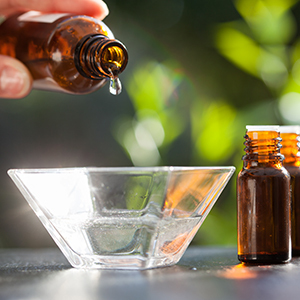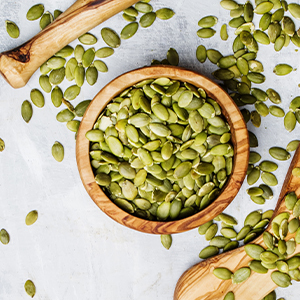
Washing your hair seems like a straightforward thing: lather, rinse, repeat. But ask five people and they probably all wash their hair at different frequencies — and may not even be sure if they should wash more or less often.
Washing too frequently can dry out your hair. Your scalp produces sebum, or oil, that keeps hair soft and shiny. If you wash too often, you may prevent your scalp's natural oil from traveling down the length of the hair, which keeps it moisturized. Excess washing can also dry hair, increasing breakage and split ends. If you dye your hair, washing daily can cause the color to fade more quickly.
Not washing often enough can also cause issues, such as greasy hair, but knowing how often to wash depends on your hair type. Infrequent washing does not cause dandruff, as many believe, but excess oil can make dandruff appear worse. Dandruff is caused by yeast that lives on the scalp, and excess oil can feed more yeast.
What Are the Different Hair Types?
How often you should wash your hair depends a lot on your hair type, hair porosity, how much dirt is in your hair, and other factors, so let's break down the different kinds of hair.
Kinky Hair
Afro-textured or kinky hair grows in three different subtypes: 4a, 4b, and 4c. Type 4a has an S-shaped coil which is the loosest among these kinky hair types. Type 4b has a Z-shaped coil, and is slightly more tightly coiled, while type 4c is the tightest coil and shrinks 70 to 75 percent. Kinky hair, particularly 4c hair, is the most brittle and breakable.
Curly Hair
Curly hair also has three subtypes: 3a, 3b, and 3c. Type 3a is the loosest curl, though still quite defined. Type 3b is more coarse and dense than 3a. Type 3c is the most tightly coiled of curly hair and is sometimes called a corkscrew-shaped curl.
Wavy Hair
Wavy hair, or type 2 hair, falls in loose waves somewhere in between straight hair and curly hair. Wavy hair is often straighter near the scalp, with waves and curls starting near the ears and going down the length of the hair. Type 2a waves are loose and tousled with hair typically fine and thin. Type 2b has more texture than 2a with defined but loose S-shaped waves. Type 2c is the most defined wavy hair, with waves starting at the roots.
Straight Hair
Type 1, straight hair, has no subtypes. It falls straight from the root to the tip of the hair. Sometimes people have different curl pattern types on their head, however, so you may have mostly straight hair with some type 2 hair mixed in.
How Many Times a Week Should You Wash Your Hair?
How often you wash your hair comes down to hair texture, length, and personal preference. What happens if you wash your hair every day? Well, it depends on your hair. Some people feel they have to wash daily, while in some cultures, people with kinky and curly hair wash less frequently to protect their hair from breakage.
Although there isn't an exact science to determine how many times a week you should wash your hair, there are some general guidelines that can help you decide.
If You Have Oily Hair
All other things considered, the oilier your hair is, the more often you should wash it. For some, this may mean washing daily, or even more, such as in the morning and after a workout.
If You Have Thin or Straight Hair
Fine and straight hair typically requires washing every one to three days. However, if your hair is oily, you can wash more often.
If You Have Thick, Coarse Hair
It's better to skip at least one day in between washes if you have thick or coarse hair — or you may be able to go even longer. You know your hair better than anyone else, so do what's best given your hair type, and whether it tends to be oily or dry.
If You Have Curly Hair
Depending on how thick and oily your curls are, you can typically wash once every three days. Curly hair is sometimes frizzy so you may also shampoo less frequently than people with wavy, straight, or oily hair. Consider co-washing (using only conditioner) between shampoos.
If You Have Kinky or Afro Hair
Wash no more than once a week, or every other week, since your hair and scalp tend to be drier and more delicate. The American Academy of Dermatology recommends people with kinky hair use a hot oil treatment once a month to help maintain hair moisture and elasticity.[1]
If You Have Dyed Hair
Washing every two to three days will help maintain color better and also help your hair retain its natural moisture. It's best to wash processed, dyed hair less frequently since the chemicals strip the cuticles and dry out the hair.
If You Exercise Frequently
It's not necessary to wash your hair after every workout since doing so can damage hair, unless you work up a heavy sweat or your hair is particularly oily. If you want to wash after every workout, just make sure you use a moisturizing conditioner or a conditioning shampoo.
If You Have Short Hair
Some women with short hair may only have to shampoo once every two to three days, but it can vary depending on hair type, so factor that into your consideration, as well.
If You're a Guy
How often should men wash their hair? Because men's hair is typically shorter, men can wash less frequently, such as once every two or three days. Men with longer hair can follow the guidelines above.
What Shampoo Should You Use?
The best shampoo depends on your hair type and other specific requirements. People with dyed hair may want to use a shampoo that helps retain color, while people with processed hair should use a moisturizing shampoo. Below are a few tips for selecting the best shampoo for you.
If You Have Oily Hair
Clarifying shampoos can help cut down on the buildup of oil and hair products. Most natural, clarifying shampoos contain ingredients such as aloe vera, chamomile, and tea tree oil to help reduce the oil on your scalp.
If You Have Thin or Straight Hair
A volumizing shampoo can help thin, straight hair appear thicker. These shampoos don't contain any ingredients that add volume. Instead, they cleanse the scalp and hair without leaving behind any residue that can weigh hair down. Because of this, volumizing shampoos often contain similar ingredients as clarifying shampoos.
If You Have Thick, Curly, Kinky, or Afro Hair
Moisturizing shampoos will help prevent frizz and keep hair healthy. Natural moisturizing shampoos contain ingredients such as coconut oil, buriti fruit oil, and shea butter. It's particularly important not to use any products with drying or harsh chemicals. Co-washing, or "washing" with conditioner, is a common and helpful practice.
If You Have a Dry, Flaky Scalp
If you have a scalp condition such as dandruff, psoriasis, or seborrheic dermatitis, or your scalp is simply flaky and dry, use a shampoo designed to help an itchy scalp.
What Is the Best Shampoo?
Your scalp can absorb the chemicals in shampoo, so I recommend you only use non-toxic, organic shampoos. They contain natural minerals, herbal extracts, and oils to cleanse and nourish the hair and scalp.
Tips for Hair Washing
You may think you know how to wash your hair. And while there isn't necessarily a “wrong" way to wash your hair, there are some practices to keep your hair healthy.
Concentrate Shampoo on the Scalp
Shampoo is primarily for your scalp, so be sure to lather up on top. You don't have to shampoo all the way to the tips of your hair. In fact, doing so can lead to fly-aways and dull, flat, or frizzy hair. Be gentle. Wash the scalp and let the shampoo run through the length of your hair.
Condition Regularly
Anytime you shampoo, follow up with conditioner. Shampoo can dry your locks, while conditioner rehydrates hair and helps it look shiny and attractive. Conditioning hair is especially important for people with processed, permed, and dyed hair. It increases hair strength, protects it from damaging UV rays, helps prevent breakage, and may help hair growth.
In contrast to shampoo, work conditioner through to the tips of your hair, but avoid applying too much on the scalp. If you have oily hair, lightweight conditioners tend to keep hair from getting weighed down. If you have kinky hair, ingredients such as shea butter and argan oil can help nourish both natural and relaxed hair. If you have thin or fine hair that tends to get weighed down by conditioner, you may also want to try reverse washing. This is when you first apply conditioner all over and let it soak in for a minute or longer. Rinse, then apply shampoo as you normally would.
Let Hair Dry Naturally
Avoid blow-drying your hair after a shower, which can cause damage. It's also tempting to rub your hair with a towel, but this can damage your locks. Instead, wrap your hair in a towel to absorb the water and let it dry on its own. People with kinky or even curly hair may want to use a microfiber towel to prevent breakage, and sleep in a silk bonnet or on a silk pillowcase.
Don't Brush Too Frequently
Some people used to think that brushing 100 strokes a day grew luxurious locks. While brushing hair brings natural oils from the pores down the hair shaft, brushing or combing too frequently may damage delicate hair, especially curly and kinky hair. People with type 4 hair should only brush when their hair is wet and with ample leave-in conditioner.
How to Keep Your Hair Healthy Between Washes
There are solutions to keeping healthy hair and looking great when you don't wash every day. For more ideas, check out our natural hair care tips article.
Organic Dry Shampoo
Dry shampoo soaks up oil, allowing you to wash less often. You'll still have to wash your hair or the product will build up, but you can shampoo using water less often. To use dry shampoo, spray or sprinkle it onto two-inch sections of hair, holding the can at least six inches from your scalp. Rub it gently through your locks. Choose an organic dry shampoo which has no toxic ingredients.
Organic Baby Powder
Some people use baby powder in place of dry shampoo, which also soaks up oil. However, choose an organic, talc-free baby powder. Conventional baby powder contains talc, and in its natural form, talc contains asbestos, which is a carcinogen. According to the National Cancer Society, all products containing talc sold in the U.S. have been free of asbestos since the 1970s.[2] But many prefer to use organic baby powder to avoid any potentially harmful ingredients.
Co-Washing
Co-washing is short for “conditioner-only washing," a practice many women with kinky, curly, or dry hair use to keep their hair soft, smooth, and clean without drying it out with shampoo. Avoid co-washing with a conditioner that contains silicone, which is often found in conventional products and can accumulate and dull the appearance of hair. A "cleansing conditioner" can be best, especially if you have fine hair, or your hair may end up looking weighed down. Apply like you would shampoo, massaging it into your scalp. Then, unlike shampoo, work it through to the ends. Rinse, and you're set. If you co-wash, use a clarifying shampoo every one to four weeks to eliminate product buildup.
Limit Heat
Blow-drying your hair or using a straightening iron, curling iron, or other hot tools, can damage your hair. Avoid using these as much as possible, aiming for no more than once a week. When you do use heating tools, minimize the amount of time they contact your hair. If you do apply heat to your hair, use thermal protectant products to minimize damage. Natural ingredients for these heat-protecting products include shea butter, Jamaican black castor oil, argan oil, or algae extract.
Style Hair Gently
Try not to pull your hair back too tightly, and use gentle hair ties designed for use in hair. People with kinky hair should take extra caution to avoid wearing tight headbands, as they may cause breakage along the delicate edges of the hairline. Also, be gentle when using a brush or comb.
Points to Remember
How often you wash your hair often comes down to your personal preference. Generally, the oiler your hair, the more often you may want to wash it, whereas thicker, drier, and kinky Afro hair can typically go a few days between washing. Use an appropriate shampoo for your hair type, concentrating on the scalp. Then apply conditioner to the ends.
Be gentle to your hair between washes. When you can, let your hair dry naturally and avoid styling tools that use heat. If you pull your hair back, use hair ties and headbands that are meant for use in hair. Try an all-natural shampoo that will leave your hair feeling luxurious and healthy. If you want a supplement for healthy skin and hair, consider taking biotin.
References (2)
- African-American hair: Tips for everyday care. American Academy of Dermatology. Accessed 13 Aug. 2018.
- Talcum Powder and Cancer. American Cancer Society. 2017.
†Results may vary. Information and statements made are for education purposes and are not intended to replace the advice of your doctor. If you have a severe medical condition or health concern, see your physician.







